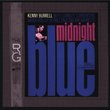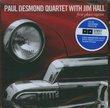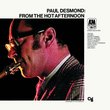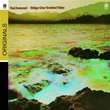| All Artists: Paul Desmond Title: Summertime Members Wishing: 0 Total Copies: 0 Label: Universal/a&M Release Date: 12/26/2005 Album Type: Import, Limited Edition, Original recording remastered Genre: Jazz Style: Cool Jazz Number of Discs: 1 SwapaCD Credits: 1 |
Search - Paul Desmond :: Summertime
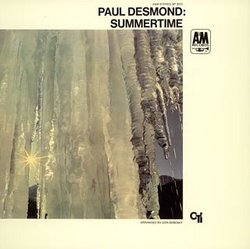 | Paul Desmond Summertime Genre: Jazz
Limited edition Japanese pressing has been remastered and comes in a miniature LP sleeve. A&M. 2005. |
Larger Image |
CD DetailsSynopsis
Album Description Limited edition Japanese pressing has been remastered and comes in a miniature LP sleeve. A&M. 2005. Similar CDs
|
CD Reviews"This album introduced me to Paul Desmond". Yvonne P. Joseph | Brooklyn, New York | 02/02/2003 (5 out of 5 stars) "My father had the lp record of Paul Desmond's "Summertime" (and I own it, now). When I was about 6 or 7 years old, I remember seeing Paul Desmond's picture on the back of the album. I was quite drawn to his odd looks. I commented that he resembled Mr. Whipple of the 'Charmin' television ads. This was in the mid-1970's. After my father's death, when I was around 18 years of age, I decided to listen to "Summertime" for the first time. From that moment onward, I was hooked on Paul Desmond's music. Despite there are one or two tracks I don't care for, I love this album! "Summertime" has a relaxing, laid-back feel to it. My favorite tracks are "Struttin' With Some Barbecue", "Lady In Cement", the title track "Summertime", and, especially, "Autumn Leaves". This rendition of "Autumn Leaves" -- bossa nova style --is the most beautiful I've ever heard of the classic Johnny Mercer tune. I play it often. Also, Desmond's version of "Lady In Cement", based on the Frank Sinatra film of the late '60's, is stunning and adventurous. A crime drama easily comes to mind upon hearing it.I'm very happy to see that "Summertime" is now available on cd, and will be ordering it soon! I hope that same picture of Paul Desmond in dark-colored clothing, and with his odd looks, will be on the back of the cd. It will serve as a reminder of my 'chance meeting' of him when I was a child. Paul Desmond was, indeed, the best!" VERY ENJOYABLE SOUND Patrick S. Murphy | Eldersburg, Md. United States | 04/13/2002 (5 out of 5 stars) "VERY NICE RECORDING JOB ON THESE CUTS. WELL WORTH THE EXTRA $ FOR AN IMPORT CD. EVERY INSTRUMENT COMES THROUGH CLEARLY-SOFT OR LOUD. NICE MIX OF TUNES WITH DESMOND AT HIS FINEST. HIGHLY RECOMMEND TO ANY UNSURE BUYERS. RELAX AND LISTEN TO AFTER A LONG HARD DAY AND YOUR STRESSES AND WORRIES WILL SOON BE GONE.Patrick Murphy Eldersburg, Md." A Rare Find In His Canon Edward Abbott | Stuart, FL USA | 02/06/2008 (5 out of 5 stars) "Paul Desmond is widely recognized for his genius as a melodic improviser and as the benchmark of cool jazz sax players.
His warm, elegant tone was one that he admittedly tried to make sound like a dry martini. He and Art Pepper were virtually the only alto players of their generation not directly influenced by Charlie Parker. Desmond was influenced by Lester Young, but took it further, into melodic and harmonic worlds never before traveled by reedmen -- especially in the upper registers. Desmond is best known for his years with the Dave Brubeck Quartet (1959-1967) and his infamous composition "Take Five." He met Brubeck in the late '40s and played with his Octet. The Quartet formed toward the end of 1950 and took final shape with Eugene Wright and Joe Morello a few years later. Jazz at Oberlin and Take Five were considered essential purchases by college students of the era, but Jazz Impressions of Japan was its most innovative recording. Desmond played his loping, slow, ordered, and intricate solos in direct contrast to the pianist's obsession with large chords, creating a myriad of textures for melodic and rhythmic counterpoint unlike any heard in jazz. His witty quotations from musicals, classical pieces, and folk songs were also a watermark of his artistry. When the Quartet split in 1967, Desmond began an intermittent yet satisfying recording career. It included dates with Gerry Mulligan for Verve, various sessions with Jim Hall, and a concert with the the Modern Jazz Quartet. He played his last gigs with the Brubeck Quartet at reunions before dying of lung cancer. Desmond's recordings for RCA have gotten box-set treatment and Mosaic issued one of the complete sessions with Hall. There are also pressings from A&M and CTI, though recordings on Artist House and Finesse remain regrettably out of print. This album is Summertime on the A&M Label recorded in 1968 and released in 1969. Track Listing: Samba With Some Barbecue Olvidar Ob-La-Di,Ob-La-Da Emily Someday My Prince Will Come Autumn Leaves Where Is Love Lady In Cement North By Northeast Summertime Recorded at Van Gelder Studios by Rudy Van Gelder on October 10,16,25 and November 5 and 20 as well as December 26, 1968. Produced by Creed Taylor. A whos, who of jazz were his sidemen on this album, which is far to numerous to list here. When the Dave Brubeck Quartet called it a set at the end of 1967, Paul Desmond decided it was high time for Time Out. And rightly so. After all, he had been with the quartet since "before the Crimean War" (factually, 17 years), logged a milllion-pius miles in air travel, cut 50 or so LPs and played in as many countries, and was plain bushed. For nine months he never laid lips on an alto sax. Four of those months he whiled away pleasantly in a rented house in Montego Bay. There he conceived the idea and set down the first jottings for a book of reminiscences-a book tentatively titled How Many Are There In Your Quartet? It was a question Paul and his colleagues had learned to live with, since it was put to them so sweetly-and so often!-by airline stewardesses. Summertime is Paul's first post-Brubeck reading and it was quite an experience. "Being in a fur-lined jet cocoon all those years," he recalls, "I had never been around New York really long enough to play with other musicians. Then to walk into a recording studio and have everything work so beautifully. Ron Carter (bass) and Herbie Hancock (piano) are both geniuses and incredibly easy to work with. The same goes for Airto Moreira, the Brazilian percussion player." Summertime brings together some of Paul Desmond's most favorite things. It's a mixed bag of gems whose brilliant arrangements-all bearing the imprimatur of Don Sebesky are large on excitement and ingenuity. If there is a bias in the treatments, it perhaps inclines toward a Caribbean-South Atlantic axis whose poles might well be Montego Bay and Rio. But the ultimate criterion for inclusion was pragmatic: every number had to make it in the rendering. Observe how there isn't a loser in the pack. Louis Armstrong might have to listen twice to recognize his Struttin' With Some Barbecue, which he wrote way back in 1941. In 1969, Struttin's lost its Dixie beat (but not its melody) and gone the Brazilian route. It moves along with a lively,lyrica'gait. Arranger Sebesky doubles as composer in Olvidar, a lovely, jaunter that sets Desmond way up there in a slow, dreamy remembrance of things past-you have to allow even this engagingly self-deprecating sax player his vanity." |

 Track Listings (10) - Disc #1
Track Listings (10) - Disc #1